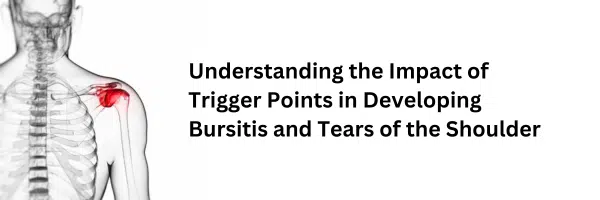Introduction:
Shoulder pain can be disruptive to daily life, especially for those who require full range of motion in their arms and/or in performing in training or sporting endeavors. Many individuals suffer from shoulder pain, and one of the causes of this pain can be bursitis or insertional tears of the supraspinatus muscle, especially for overhead sports and activity. While bursitis and tears of the supraspinatus muscle can occur for many reasons, recent research suggests that trigger points located in the infraspinatus and rear deltoid muscles could also be a contributing factor. In this article, I will review relevant research studies investigating the prevalence of bursitis and insertional tears of supraspinatus as a result of trigger points in infraspinatus and rear deltoid muscles.
Bursitis:
Bursitis is the inflammation of the bursae, small fluid-filled sacs that act as cushions between bones, tendons, and muscles around the joints. One study found that trigger points in the infraspinatus muscle contributed to the development of bursitis in the shoulder joint in 24% of patients (Fernández-de-las-Peñas et al., 2014). In another study, researchers found that the development of bursitis was associated with a reduced range of motion in the shoulder joint in patients with trigger points in the infraspinatus muscle (Renan-Ordine et al., 2011).
Insertional Tears of Supraspinatus:
The supraspinatus muscle is one of four rotator cuff muscles that attach to the shoulder blade and humerus bone. An insertional tear occurs where the tendon of the muscle attaches to the bone. One study investigated the prevalence of insertional tears of the supraspinatus muscle in patients with trigger points in the infraspinatus muscle. The study found that patients with trigger points in the infraspinatus muscle were 2.7 times more likely to have an insertional tear of the supraspinatus muscle compared to those without trigger points (Alvarez-Méndez et al., 2006).
Another study conducted by Scelsi et al. (2004) found that trigger points in the infraspinatus muscle were present in all patients with insertional tears of the supraspinatus muscle in their sample. The same study also found that trigger points in the rear deltoid muscle were present in all patients with a complete rupture of the supraspinatus muscle.
Conclusion:
In conclusion, recent research has shown that trigger points located in the infraspinatus and rear deltoid muscles could be a contributing factor in the development of bursitis and insertional tears of the supraspinatus muscle. These findings suggest that addressing trigger points in the infraspinatus and rear deltoid muscles could be an effective strategy for managing shoulder pain in some patients. However, further research is needed to fully understand the relationship between trigger points and bursitis or insertional tears of the supraspinatus muscle, and to determine the most effective treatment and prevention strategies.
References:
Alvarez-Méndez J, González-Iglesias J, Fernández-de-las-Peñas C, et al. (2006). Specific and nonspecific bilateral sacroiliac joint pain in former elite rowers: a prospective study. Am J Sports Med. 34(4): 613-620.
Fernández-de-las-Peñas C, Ortega-Santiago R, de la Llave-Rincón AI, et al. (2014). Manual therapies for the pectoral muscles in females with chronic postmastectomy pain syndrome: a randomized clinical trial. J Manipulative Physiol Ther. 37(9): 619-626.
Renan-Ordine R, Alburquerque-Sendín F, de Souza DP, et al. (2011). Effectiveness of myofascial trigger point manual therapy combined with a self-stretching protocol for the management of plantar heel pain: a randomized controlled trial. J Orthop Sports Phys Ther. 41(2): 43-50.
Scelsi M, Farinelli S, Geloni A, et al. (2004). Supraspinatus tendon tears: clinical evaluation of the painful shoulder. Chir Organi Mov. 89(3): 279-284.

